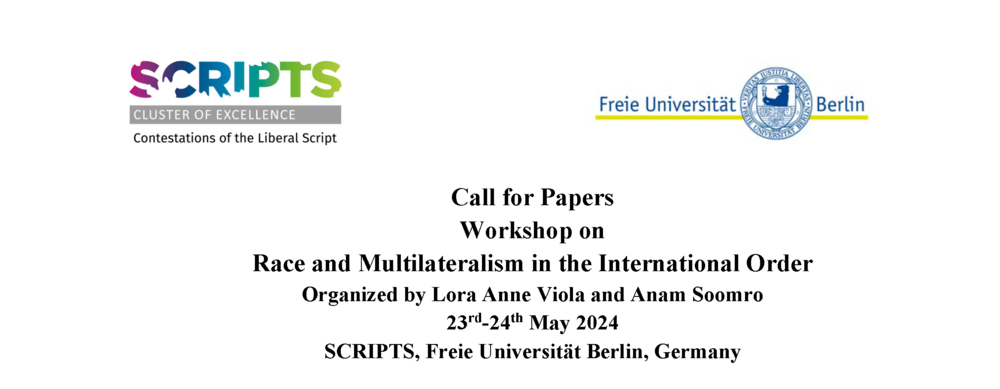Call for Papers: Workshop on Race and Multilateralism in the International Order
The research project “Race and Multilateralism: The Anatomy of a Complex Relationship” (RAM) based at the Freie Universität Berlin and funded by SCRIPTS, is organising a workshop on 23rd-24th May 2024 on the relationship between race and multilateralism in the international order.
Call for Papers (PDF)Deadline: 05 January, 2024
News from Nov 15, 2023
International cooperation and global governance in the post-1945 era has been primarily organized via multinational institutions— most prominently the United Nations and its subsidiary agencies. The centrality of multilateral institutions to international order-making coincided with the decline of empires and the need to recognise a universal right of self-determination. Multilateralism was pursued explicitly as an alternative form of ordering in light of the end of imperialism, including the end of the racialized inequalities and dominations that characterized imperialism. While imperialism was historically designed around the racialized standard of civilization, multilateralism was newly designed around principled commitments to equality of actors. Multilateralism claims to have strengthened norms of decolonization, human rights, universality and supports international cooperation in a peaceful manner. At the same time, this new order was itself steeped in imperialist thinking, deeply hierarchical, and Eurocentric. Many scholars have shown how multilateral institutions—from the League of Nations to the founding of the UN, as well as the development of international law itself, are legacies of imperialist thinking and in part motivated by European imperialist goals of maintaining colonial control. Thus, imperialism and multilateralism intersect in varied ways, including their empirical co-existence and mutual reinforcement (e.g. empires as members of multilateral institutions and multilateralism as means of securing hierarchies), and their empirical and ideational conflict (e.g. multilateralism’s rhetorical commitment to decolonization, selfdetermination, and equality). Acknowledging the entangled histories of imperialism and multilateralism, this workshop seeks to investigate how racial hierarchies get re-constituted in the move from imperialism to multilateralism and with what consequences. What happens to racialized hierarchies as empire becomes replaced with multilateralism as the dominant form of international cooperation? What do multilateral arrangements do to and with racial coding of human difference? What happens to racialized hierarchies when, in formal terms, racialized hierarchies disappear from multilateral institutional arrangements? How do conceptions of race and racialized hierarchies transform? How are racial injustices and inequalities differently contested within imperial vs multilateral institutions?
We welcome papers that address these and related themes in theoretical or empirical terms and from country-specific, regional, comparative, or global perspectives:
- How are racial politics implicated in the origins and development of multilateralism as an institutional form, especially in comparative analysis to imperialism as an institutional form? What explains continuities and discontinuities?
- How have multilateral international institutions constructed and shaped the meaning of “race” through policies, conventions, agreements, and how/why have these changed over time? How do race, racism, and anti-racism shape the work of international organizations, diplomacy, and international law?
- What explains different traditions and mechanisms of contesting racial hierarchy in international society? How do variations in racial representation and claims of representativeness affect multilateral decision-making and institutional legitimacy?
The workshop aims to bring together both junior and senior scholars from a range of related disciplines, such as political science, history, and international law. Selected papers will be presented and discussed at an in-person workshop in Berlin. Participants will be provided with a travel stipend and accommodation. We especially encourage emerging scholars, and scholars located in the global south to apply. The workshop seeks to contribute to building a network of scholars working on race and international order and it also aims to pursue a common publication project. Based on the interest of participants and coherence of the papers in this first workshop, we will organize a follow-up workshop to continue the collaboration.
To apply, please submit a 250-300 word research paper proposal related to the workshop themes by 5th January 2024. Please submit abstracts to raceandmultilateralism@gmail.com with the email subject ‘Submission to Workshop’. Decisions will be made by 31st January 2024, and it is expected that participants will circulate draft papers by 30 April 2024. The
workshop will be held in Berlin from 23-24th May 2024. For further information, please write to raceandmultilateralism@gmail.com.

